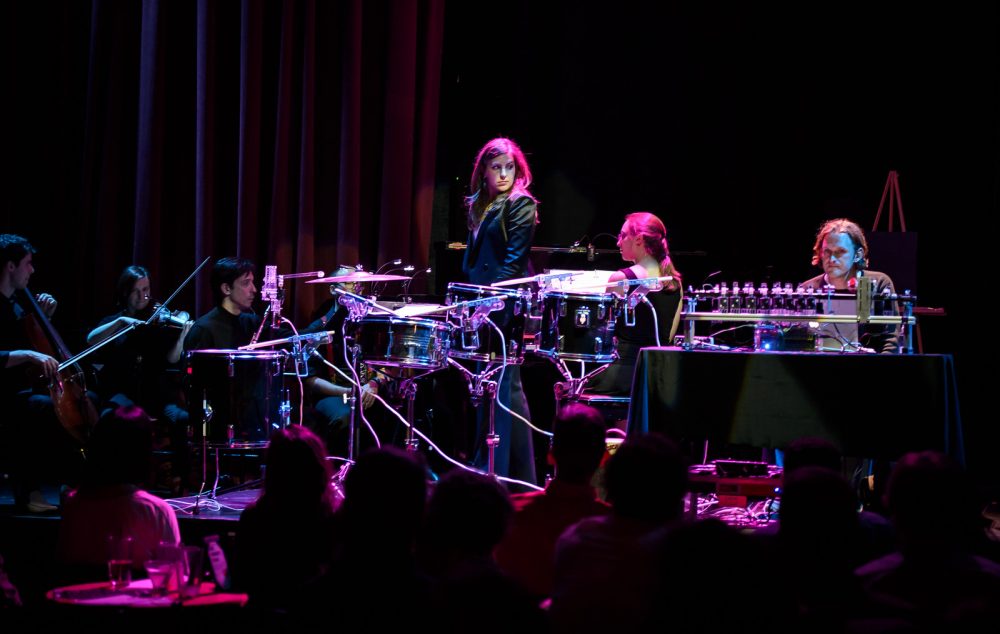Advertisement
First-Ever Boston New Music Festival Wants You To Hear City's Thriving Contemporary Scene

New has gotten even newer in the last decade. At least as far as music in Boston is concerned.
"Boston is a hotbed for development and performance of new music groups," says conductor Lidiya Yankovskaya, who leads one such organization, Juventas New Music Ensemble. “In the past 10 or 11 years, a plethora of music organizations have been formed. Even I can’t keep up with them.”
So Yankovskaya and Juventas decided to do some organizing. The result is the Boston New Music Festival kickoff concert at the Oberon in Cambridge on Wednesday, Nov. 2.
"Overall, there hasn’t been much collaboration," she says. "Our idea is a festival similar to BEMF” — the Boston Early Music Festival, a biennial series of concerts and conferences for early music performers. "The early music players come together, and so can we."
"The early music players come together, and so can we."
Lidiya Yankovskaya
Yankovskaya says, for this effort, she connected with all of the Boston-area ensembles that have a mission for new music.
"Even though we couldn’t fit everyone on one program, it’s an impressive start," she says.
Don’t think for a minute that this is some collective of starving musicians who only play in basement apartments or busk on street corners. BNMF features Juventas of course, whose mission for the past decade has focused on emerging composers. But also Dinosaur Annex, who have championed new music for decades. And Friends of Madame White Snake, the brainchild of Cerise Lim Jacobs, who presented the week-long Ouroboros Trilogy of operas in Boston in September. With performers like Donald Berman (piano), Aliana de la Guardia (soprano), Alea III and Transient Canvas, the kickoff concert will be much more than just a party.
And it’s only a beginning, if Yankovskaya has her way.
Advertisement
"Cerise is producing a new opera by Julian Wachner, ‘Rev. 23,’ next year," Yankovskaya says. “I’m conducting, and we’d like to use that great opportunity to create a larger festival. We decided to do this kickoff to initiate the collaboration.”
“I think it’s a great idea,” says de la Guardia. She sings on the program in one of her guises — the ensemble Dirty Paloma, with saxophonist Philipp Stäudlin. She is also the founder of Guerilla Opera, a chamber opera initiative that has presented new works each season for a decade now.
“Some of us have more of a niche in the Boston new music scene than others,” she says. “I think there has to be individual groups, that have their own branding and mission, but there has to be a place for all of us to come together too. A festival, or something like that, where we can hear composers that we have never heard before, and share an audience, that’s a great idea.
"The shared audience is the important thing. There are some people that will go to a Juventas opera but don’t know about Guerilla Opera," de la Guardia says. "It’s an opportunity to share and to gain wider exposure."
Boston has quietly become a center for new music. It didn’t start last week, or with this concert. Boston Musica Viva has presented contemporary works for more than 40 years, and Gil Rose’s Boston Modern Orchestra Project has as well for 20 years. Dinosaur Annex and Alea III are hardly newcomers to new music.
But there has been an uptick in new music ensembles in the past decade. Sound Icon, Juventas, Guerilla Opera, Kadence Arts, Floating Tower, the New Gallery Concert Series — all of these groups, and more, are part of a thriving culture that takes advantage of Boston’s multiple conservatories, talented freelancers and informed audiences.
"I’m optimistic about where we are as opposed to where we were."
Lidiya Yankovskaya
“I do think it started around 2007, when we founded Guerilla Opera,” de la Guardia says. “That’s the time when chamber opera started to become popular — now it’s super popular. It’s good to see.”
“I’m optimistic about where we are,” Yankovskaya says, “as opposed to where we were. There’s still the problem of new works never getting performed a second time. My hope is that we can create a longer life and more vibrant career path for composers and new works. In today’s music world there is still a large divide between the newest of the new, and the old, and not enough cross pollination.”
A snippet of Wachner’s “Rev. 23” will be performed on the Nov. 2 concert, along with a new opera, timely to be sure, entitled “The Drumpf and the Rhinemaidens.” The chamber setting for percussion, piano and voices was written by Matti Kovler and recently premiered in New York. The opera features ... well, you could guess who. His three wives play important roles and his comb-over becomes its own character.
Music from Marti Epstein, Judith Weir, Peter Van Zandt Lane and a world premiere from Wesley Troeger also fill the bill.
Here's a taste of Van Zandt Lane's work:
“We found more than 30 organizations when we started reaching out,” Yankovskaya says. “The only other place like that is maybe New York. My hope is that we can bring these organizations together, and eventually place Boston on the map as a leader in new music.”
The kick-off concert for the Boston New Music Festival takes place Nov. 2 at 7:30 p.m. in Oberon, 2 Arrow St., Cambridge. For tickets and information visit Juventas' website.
